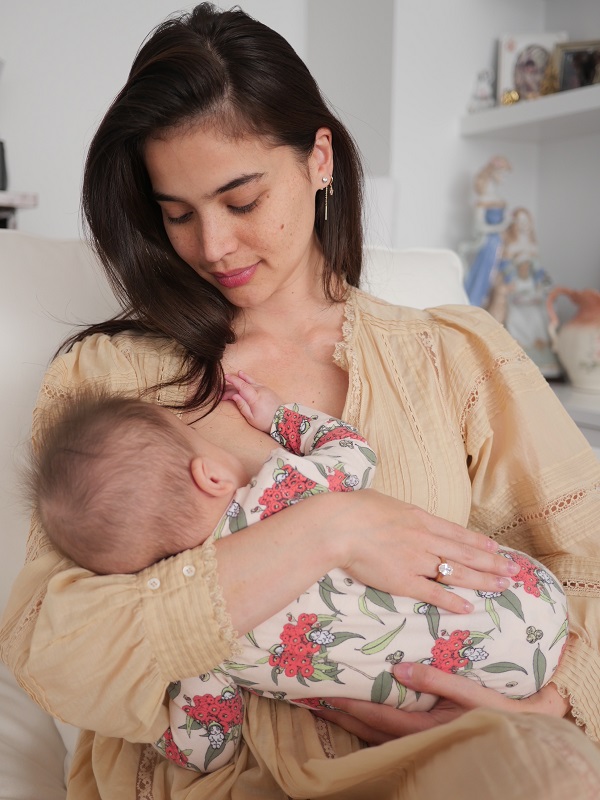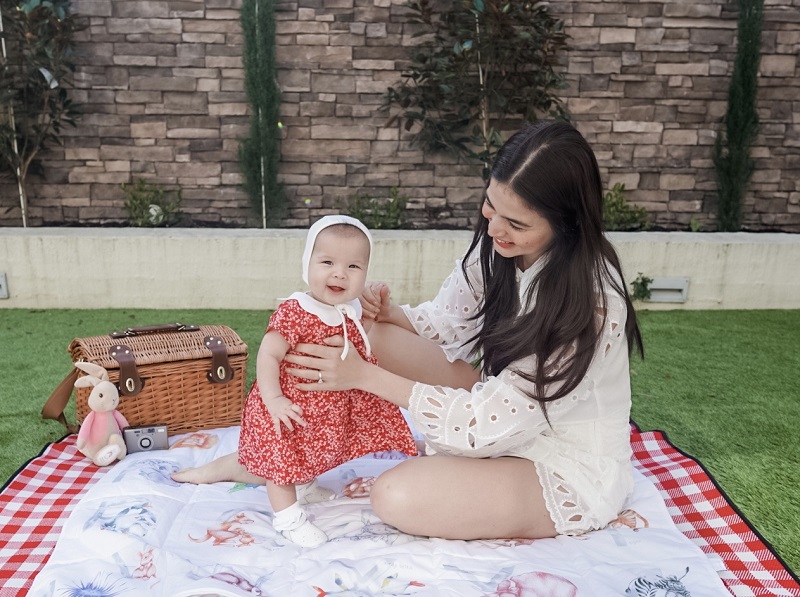Actress Anne Curtis’ new role is her best, yet most challenging part yet – that of a first-time mother, determined to give daughter Dahlia the best possible start in life.
For her, this means breastfeeding.

Anne shared her breastfeeding journey with UNICEF in celebration of National Breastfeeding Month as well as the 10th Anniversary of the Breastfeeding TSEK! (Tama, Sapat, Eksklusibo/Correct, Enough and Exclusive) Campaign by the Department of Health (DOH), UNICEF, and the World Health Organization (WHO).
Anne is among the wide range of celebrities, influencers and other partners that UNICEF collaborates with in the Philippines to realize the rights of every adolescent, mother and child to survive, live a healthy life, and thrive.
According to Anne, it was her work as a UNICEF Philippines National Ambassador that strengthened her resolve to breastfeed.

“I would go on field visits with UNICEF, and they would really educate me about the importance of breastmilk for newborn and child’s health. It’s a beautiful journey for you and the child, but aside from that, the benefits of breastmilk are mindblowing!”
Breastmilk can act as the baby’s “first vaccine,” protecting against many common childhood diseases, according to UNICEF Philippines Representative Oyunsaikhan Dendevnorov.
“Initiation of breastfeeding within the first hour of birth, followed by exclusive breastfeeding for six months, the introduction of age-appropriate complementary foods at six months and continued breastfeeding for up to two years or beyond offer a powerful line of defense against all forms of child malnutrition, including wasting and obesity.”
Mothers also benefit, with multiple studies linking breastfeeding with a reduced risk of breast and ovarian cancer – two leading causes of death among women.
“The more I learned about it,” Anne enthuses, “it made me decide I really want to persevere and breastfeed my first baby.”
A Shared Responsibility
Anne admits that there is a learning curve with breastfeeding – one made even more challenging by the pandemic and her isolation from most family and friends.
Thankfully, Anne had the support of her mother and husband Erwan Heussaff, who were able to stay with her in lockdown.
“Because your hands are so full with the newborn, parang lahat ng oras mo, doon nakatutok. Iba yung energy na nawawala sayo pag nagbebreastfeed ka.” (It’s like all your time is focused on that. The energy drained from you during breastfeeding is something else.)
“Maswerte ako sa asawa ko (I’m lucky to have my husband). Because he knew that I was passing nutrients on to my baby, he made sure that what the mother was eating was good for the baby as well.”
According to Anne, the most important help was the emotional support her family gave her when she was breastfeeding.
“At one point mafifeel mo na parang ‘am I failing? Am I not doing it right?’ Pero I think yung support and warmth of the words and telling me na parang ‘kaya mo yan’ – that really helped me.” (At one point, you feel like ‘am I failing? Am I not doing it right? But I think the support and warmth of their words and their saying things like ‘you can do it’ – that really helped me.)
Anne says she was also able to develop a wider support network – even in the time of social distancing.
“I was in Australia when I gave birth. Meron silang binuo na parang ‘mother and child’ group na kasabay mo in your area na nanganak (They formed a ‘mother and child’ group in our area with other women who gave birth around the same time).
So I was able to make a new friend, and we were really speaking to each other. It really helped having someone who could relate with what I was going through as a mother, and ask for advice.”
Support Systems
While Anne was able to get adequate support during the lockdown, UNICEF acknowledges many others might not be so lucky.
“With the COVID-19 pandemic causing disruptions in breastfeeding support services while increasing the risk of food insecurity and malnutrition, prioritizing breastfeeding-friendly environments for mothers and babies is becoming even more urgent,” says Dendevnorov.
In the Philippines, UNICEF works with the DOH, National Nutrition Council, Local Government Units, and relevant agencies to strengthen research, policies, capacity, and evidence-based planning to develop and implement effective and efficient health and nutrition policies and programmes.
UNICEF also uses evidence-informed advocacy to increase Government investment in nutrition services and engages with communities to improve awareness and skills on good nutrition and feeding practices.
Anne staged the “Dahlia Turns 1 Birthday Fundraiser” for UNICEF, which collected PHP 1.8 Million for interventions to improve vulnerable children’s access to health services during their critical first 1,000 days of life.
You’re Not Alone
A year on, Anne says it’s still critical to seek out information to figure out what’s best for Dahlia.
This included getting the first dose of the COVID-19 vaccine upon the advice of her doctor. “It’s important is to protect yourself so you can protect your baby.”
From pregnancy to weaning, Anne attests that the breastfeeding journey can be tough. She therefore encourages other mothers to not be ashamed of the changes happening in their bodies.
“Feel free to speak to other mothers about it, speak to your pedia about it, read up about it – but just know that it happens. Don’t feel so bad about it because it is a normal process.”
“Just don’t be afraid to ask for help. Even if it’s just for someone to listen to you.”

